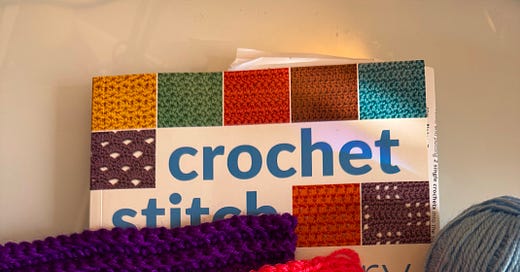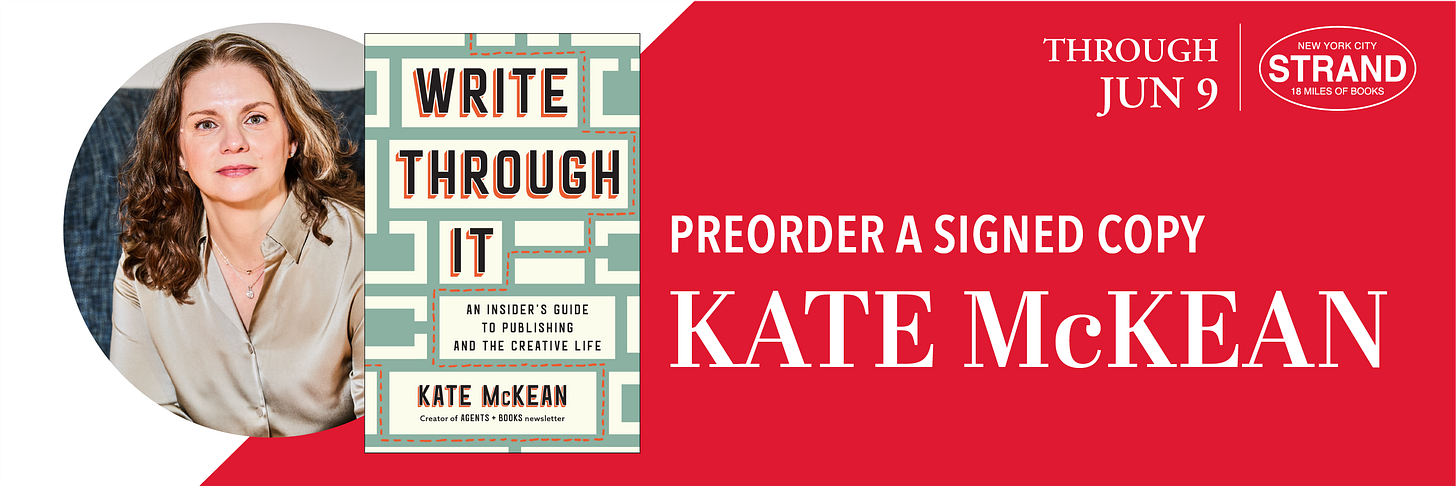Hi friends,
I’m working my way through a crochet stitch dictionary.1 For a few weeks I’ve felt the itch to make something with my hands. I have tons of craft supplies, but lately I’ve been crocheting and knitting. I can do both, mostly resulting in things shaped like squares. Scarves, etc. I thought I’d try some more complex patterns but by the end of the day, my brain is mush. I’ve been struggling with what to make that I can use that isn’t square shaped but also doesn’t take any more effort than what it takes me to make something square-shaped. I was stuck.
I learned to crochet when I was 8, and even after several decades of crocheting, I’m still only an advanced beginner, skill-wise. I bought a stitch dictionary a while back to help teach my kid to crochet and you know what, there’s a bunch of neat stitches in there. In teaching my kid, I discovered I do some foundational things wrong, and I figured practicing some easy stuff couldn’t hurt. So I found the project I can do at night when my brain is mush. I’ve decided to make all the stitches in the stitch dictionary. All 200+ of them, give or take.
I’m still just making a bunch of squares, but this time, I have a plan. I only have to think about one thing—how to do whatever stitch I’m learning, and I barely have to count. Because I’m not worrying about my square will end up sweater-shaped, I can see each stitch for what it is. Because I’m not looking at endless pages of a pattern, I don’t feel bad when I have to rip out rows because I messed up. Because there is no end goal of a finished garment, I can crochet all the stitches, or not. I can skip stitches if I want. When I’m done, I’ll have a stack of squares and I might be able to make something of it. Or not. I’m not even using particularly nice yarn so if it doesn’t work out I haven’t invested a bajillion dollars. The most thing I’m spending is my time, and in that I will have improved my skillset. It’s all upside even if I can’t use what I made.
You can approach writing this way. You can make something to see what happens. You can make something to learn a new skill. You can make something to see if you like it or not or if the way you’ve always done it works or not, whether the whole thing is useful or not. If you can’t use what you made it’s not wasted effort because you probably learned something in the process. If you have to unravel it all in the end, you still have those new or honed skills. You still have all that yarn (even if it’s in a bunch of little pieces). You still have the crochet hooks to make something different another time. You can start again. Maybe down the road those scraps will add up to something even better.
Just because you don’t end up with a wearable sweater doesn’t mean you wasted time making it. Just because it’s not a (sellable/functional/successful/desirable) novel doesn’t mean you wasted time writing it. I know it feels like you cannot possibly spend time writing something that won’t be published or one you won’t even try to publish because you already feel so behind or whatever, but I promise, you are not behind. It’s not a race. Impatience will not get you published any faster. It won’t make the sweater fit or the stitches perfect or the book sellable. In fact, everything you write has the chance of never being published because that’s how it works—for everyone! Ask me about the four books I have in my own desk drawer. If you are feeling lost and frozen because you want to do a thing but you don’t know if it’s “worth” doing because you don’t know if it’ll get published or not—stop. Do the thing, whatever it is. It might be published or it might not. You can make something just because you want to, because you feel like it, because it’s calling you. Those tend to be the most interesting project I see, tbh. You don’t know what shape it’s going to take until you finish. And you can’t finish until you start.
Embrace experimentation and just trying shit out to see what happens. It might be a sweater and it might not. You might have to start all over or it might come out perfectly the first time.2 Either way, the most important thing is the doing. There is value in practice. You figure out what it is in the end when you get there.
XOXOXOXO,
Kate
This is exactly what it sounds like. A book of crochet stitches you can use a reference guide.
Probably not.





As a quilt teacher this is always my first piece of guidance in a class - nothing you make has to BE anything. It can merely be a reflection of the time you spent investing in you.
Ready Fire Aim. That's my approach to writing. You get it down and in getting it down you see how close you got to the mark. The beauty of writing is that you can then inch your way closer to the mark via editing.